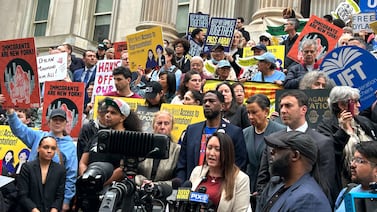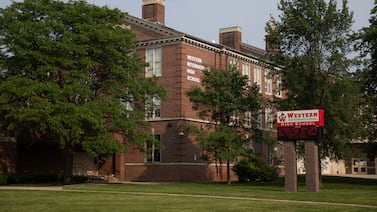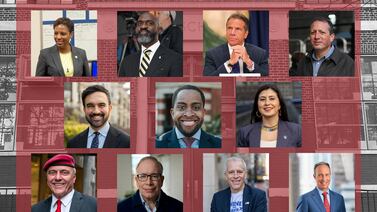Sign up for Chalkbeat Chicago’s free daily newsletter to keep up with the latest news on Chicago Public Schools.
Chicago’s new school board is considering an amendment to the school district’s $9.9 billion budget that aims to address a short-term budget quagmire.
The decision made by the 21-member, partially elected governing body could have long-term implications as Chicago Public Schools moves away from 30 years under mayoral control.
The budget amendment on the school board’s agenda for its March 20 meeting accepts an additional $139 million in unexpected revenue, but does not spell out what the board will spend the money on. It lays out three possibilities: paying the yet-to-be determined costs of a new contract with the Chicago Teachers Union, funding an inaugural collective bargaining agreement with the union representing principals, and giving the money to the city as a contribution to the retirement fund that supports non-teaching school staff.
Mayor Brandon Johnson’s administration is pushing for the latter, which would continue a practice started under former Mayor Lori Lightfoot of having the Board of Education pitch in on these pensions. The city must balance its books by the end of this month, and Johnson’s allies on the board have expressed agreement with the mayor.
But Johnson continues to face resistance from CPS CEO Pedro Martinez and district leadership, who are staring down financial challenges of their own, including a deficit of at least $500 million dollars next school year. They and at least a few new school board members have argued it’s more prudent to put the money toward labor contract costs and funding classrooms today, not helping the city make a pension payment.
The issue has become so politically controversial that it contributed to the resignation of the previous Board of Education and the firing of Martinez, who will leave in June. Indeed, the fight over the municipal pension payment is the “single, largest and, in the moment, most critically important” financial entanglement between CPS and the city, says Joe Ferguson, president of the Civic Federation, an independent, non-partisan government research organization.
Ferguson said it’s “critically imperative” that the school board and City Hall get to work on a long-term solution before the school board becomes fully elected in 2027. A new state law addressing the issue might end the drama, but legislators haven’t taken it up so far.
Two-thirds of the school board — or 14 members — would need to vote yes to approve the budget amendment.
Here’s what to know about this disagreement and the options officials have.
What is the municipal pension payment?
The Municipal Employees’ Annuity and Benefit Fund, or MEABF, supports city workers, staff of the Chicago Housing Authority, and non-teaching staff at Chicago Public Schools when they retire.
More than half of the fund’s members are current or former CPS employees — a percentage that has grown over time. CPS budget officials have noted that while 60% of the pension fund’s beneficiaries are current or former CPS employees, they account for only about one-third of the fund’s liabilities.
Even so, under state law, the Chicago city government is solely responsible to make annual payments to the fund, not CPS.
This year, the city is legally on the hook to pay that municipal pension fund $955.7 million, according to budget city documents. That’s far more than the roughly $165 million annual payment it was making just a decade ago.
Like most pension funds in Illinois and Chicago, the municipal fund has massive unfunded liabilities. Put simply, for every dollar it owes to present and future retirees, only about 25 cents is available. To fix this, the city is now required to pay more every year so that there’s enough money to pay retirees in the future.
In 2015, then-Mayor Rahm Emanuel introduced a record property tax increase that was approved by City Council to meet these growing pension obligations. The following year, the city imposed annual increases to a water-sewer tax that would be dedicated to the municipal retirement fund.
Facing a ballooning payment, Emanuel’s successor, Lori Lightfoot, implemented an intergovernmental agreement with her appointed school board in 2020 to have CPS reimburse the city for an increasing portion of the required annual payment given that school district employees make up more than half of the fund’s members. Since then, the Board of Education has made four pension payments; the most recent one in early 2024 was $175 million.
For the past year, the mayor’s office has pushed CPS to once again contribute $175 million toward the municipal pension payment — and the City Council passed a budget with that assumption.
But so far the school board has not budgeted that payment this year. Nor has it approved an intergovernmental agreement to do so.
What options does the City of Chicago have?
The city’s 2025 budget proposed by Johnson and approved by City Council in mid-December assumed CPS would, once again, kick in $175 million.
The $17.1 billion spending plan includes a $1.13 billion payment to the MEABF, more than the required amount of $955.7 million, which is calculated based on what’s needed to cover future benefits. That’s because it also includes a $168.7 million voluntary advance payment to the MEABF, which is roughly $6 million short of what the city wants from CPS.
These additional payments are similar to paying off additional principal on a mortgage. They also started under Lightfoot. However, they are not required by state law.
Senior mayoral aides said this week the advance payment is a priority for the city because it saves on long-term costs. They also said they don’t consider CPS’s $175 million contribution as going toward the advance payment.
But if CPS does not come through with the $175 million contribution, the city could drop the advance payment. That could be met with mixed reactions from credit rating agencies, said Justin Marlowe, director of the Center for Municipal Finance at the University of Chicago. Some agencies might downgrade the city, while others could be more sanguine about it.
They could also dip into reserves, which Ferguson noted would have negative consequences.
“The city’s in a position where it is adding to the storm cloud of another [credit] downgrade,” he said.
Not making the advance payment or dipping into reserves or any other changes to the city’s budget would require 26 City Council votes.
The mayor already had a difficult time getting his budget approved last fall. His administration’s initial proposal, which included a property tax hike, did not go over well with the City Council. A revised budget without that tax hike narrowly passed 27-23.
What options does CPS have?
It’s been clear since the CPS board approved a $9.9 billion budget passed last summer that the district would need to amend its spending plan once officials finished negotiations with the Chicago Teachers Union and the district’s new principals union.
For months, the mayor’s office has suggested CPS take out a loan to cover new contract costs and still kick in a portion of the municipal pension payment. More recently, Johnson’s office has suggested the district could issue municipal bonds at relatively low interest rates.
But the district has asserted that it cannot legally borrow money and show those loan proceeds as revenue in order to balance its budget. If the district is pressed to pay for both increased labor contract costs and a contribution to the municipal pension fund, CPS leaders have said they may need to make mid-year cuts or resort to layoffs or furloughs.
Senior mayoral aides continue to argue against cuts that would impact classrooms.
In its initial budget, CPS expected to get $159 million in surplus tax revenue from special development districts. An additional surplus declared by the mayor adds $139 million more to that number. The latter is the source of the new revenue in the budget amendment the Board of Education will vote on later this month.
But the additional infusion of cash isn’t enough to cover all of the district’s looming expenses. Last fall, Martinez testified before the City Council the district would need $484 million from those taxing districts to make ends meet.
Martinez said last Thursday in an email to staff and families his team will recommend to the board to prioritize spending the additional $139 million on labor contracts only — not the municipal pension payment.
CPS has limited taxing authority. It can only raise property taxes annually up to a state-imposed cap, which is 5% or the consumer price index, whichever is less. It has done that every year in recent history.
The school district has a worse credit rating than the city although the city’s rating is not much better and was also recently downgraded. But Marlowe, the municipal finance expert, said at the end of the day, it’s all the same property tax base.
“It is probably more cost effective from a taxpayer perspective, for the city to play a larger role,” Marlowe said. But he added that its important for both CPS and City Hall to do their due diligence to determine the least costly option.
“They have to make those pension payments. That’s not negotiable. So somebody’s going to have to blink and decide that the money is going to flow from from one side to the other,” he said.
What’s a long-term solution for this pension issue?
The city and the Chicago Board of Education could split responsibility for funding the MEABF longer term via two options: a stronger intergovernmental agreement, or a change to state law.
The current dispute and the fact that there is no intergovernmental agreement this year shows the limits of the first option, said Ferguson.
“If it were legally enforceable, this already would have been resolved,” Ferguson said.
Signing a new intergovernmental agreement every year is also subject to politics. Chicago will have school board elections every two years and mayoral elections take place every four.
“There’s going to be this kind of ad hoc, piecemeal thing, I think, until there is a true philosophical reckoning with: What is the relationship between the city and CPS going to be financially in a new world with a very different kind of CPS board?” Marlowe said.
A change to the state’s pension code is “the cleanest, most permanent, most enforceable” option, Ferguson said.
But that idea has its own political baggage. Illinois lawmakers have historically been reluctant to help Chicago with its pensions or financial challenges. They are also focused on revising changes made to the pension code a decade ago.
“I don’t think that there’s much appetite in Springfield for the state to play referee,” Marlowe said.
Senior mayoral aides said they are having multiple conversations in Springfield about CPS finances, but declined to speak specifically about changes to the pension obligations.
A CPS spokesperson said they are not aware of any proposed legislation to change who is responsible for the municipal pension fund. District officials said if lawmakers were to shift any responsibility to the school district, they would need to consider how to fund these payments.
This story was been updated to include additional comments from a municipal finance expert.
Reema Amin contributed.
Becky Vevea is the bureau chief for Chalkbeat Chicago. Contact Becky at bvevea@chalkbeat.org.






